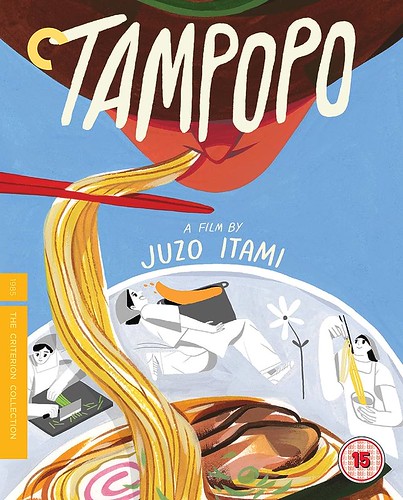4 minutes estimated reading time
I first got to see Tampopo at the 051 Cinema in Liverpool. It was a comedy, it had new wave vibes and I knew I could watch it several more times without getting bored. When I went to college a lecturer screened clips of it to emphasise the importance of observation as a market research tool – a lesson that has stuck with me to this day. Decades later I get Tampopo on Blu-Ray via Criterion Collection re-issue.
The print is way richer and better than what I saw a few times in Liverpool and it still holds my interest.
Ramen western?
Before we get into the film I want dispel the idea of the ramen western. Every magazine review you see of Tampopo will use the term ‘ramen western’ which was apparently coined by publicists during its international release. It’s a lazy phrase in the case of Tampopo for a number of reasons.
Yes, one of the protagonists has some clothing that might evoke the image of a cowboy, but that’s like writing the entire film from a few curated still images. The clothing is more about evoking the rugged individuality of a truck driver, in a largely conformist society. Their neckerchief is more about lorry cabs having no air conditioning at the time.
The best spaghetti westerns like A Fist Full of Dollars actually were adaptions of Japanese films. In the case of A Fist Full of Dollars, it’s the retelling in western setting of the Akira Kurosawa film Yojimbo. So the Ramen Western reference is basically saying ‘it’s a Japanese interpretation set around a neighbourhood restaurant of an Italian plagarisation of a Japanese chambara film classic’.
The reality is that Tampopo is more complex than the simplistic ramen western label would have you believe.
Juzo Itami
Director Juzo Itami was an auteur: actor, script writer and director. Tampopo was his second feature film and he would eventually direct eight more. Itami’s later films courted controversy with him being attacked by Yakuza members. His eventual suicide is widely believed to have been staged by members of the Goto-gumi to prevent a film that discussed the gang’s links with the Soka Gakkai buddhist movement.
Back to Tampopo
Tampopo revolves around food as art and food is also the MacGuffin for the film. In the main story, a widow is struggling to manage her ramen shop following the death of her husband the cook and shop owner.
A jobbing truck driver and drivers mate stop to eat and get sucked into a quest. The widow who is named Tampopo (Dandelion), the truck driver and driver’s mate to make great ramen and rejuvenate the fortunes of the shop.
So if Tampopo isn’t a ramen western, what is it?
The simple answer would be an action comedy revolving around a ramen shop and the art of cooking. But there is so much more in the film.
There is a second story about ‘the man in white’ which has heavy overtones of French new wave cinema and features a basket of European food fit for a decadent picnic. The fourth wall is broken and one of the characters speaks directly to the audience, adding an additional layer of complexity. We are both audience and (minor) character. Over new wave vignettes in the film include:
- Salarymen having a meal at a French restaurant
- A women’s etiquette class on how to eat spaghetti silently in the European manner
- Supermarket staff stopping an older woman with a compulsion to squeeze food
- A con man uses an elaborate meal to lure a mark into an scam
- A woman breast feeds her infant
Torakku Yarō
There are references due to the plot structure to the idea of the ronin – the unattached samurai helping out common people in the plot structure. But just as important the film references Japanese culture around that time. There is a clear parallel between Tampopo and a series of trucking related comedy films that were made from 1974 – 1979. Torakku Yarō (トラック野郎) roughly translates as Truck Guys or Truck Rascals. It is a series of ten films made over a four year period to cater for the popularity of the genre.
The plots were standardised.
- Truck driver falls in love with woman he meets on the road.
- Truck driver through his actions actually helps her fall in love with another man.
- Truck driver ends up going on a quest to help reunite the star-crossed lovers under some sort of time restriction.
In this case cooking ramen is substituted for the ‘other man’. The connections don’t stop at the plot structure, one of the main characters Pisken is played by Japanese Italian actor Rikiya Yasuoka – who appeared in the first instalment of the Torakku Yarō series.
Torakku Yarō itself was based on an earlier series of comedies called Otoko wa Tsurai yo (男はつらいよ): translated as It’s tough being a man. 48 films were made in this series from 1969 to 1995 based around the same formula.
- Tora-san falls in love with a woman
- Tora-san argues with his extended family
- Tora-san’s love of the woman is not reciprocated and he leaves heart-broken
While the humour may not fully come out from Tompopo, it’s a visual tour-de-force with great acting and a distinctive vision behind the film. I look forward to rewatching it again in the future.
More film reviews here.
